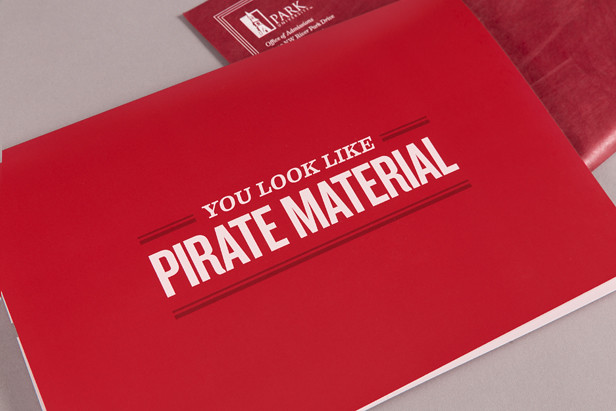You have /5 articles left.
Sign up for a free account or log in.
When this post started materializing in my brain, it felt like I was getting a bit too "get off my lawn" instead of simply showcasing the creative work of a creative company. Honestly, the idea of having to use a "marketing stunt" to recruit students just seemed a bit silly. And then I remembered that when I was 17 years old, and receiving truckloads of recruitment mailings from universities, I opened up a giant brochure from the University of Northern Iowa that when opened, transformed into a UNI-themed pennant. It was the most creative piece of mail that I had ever seen and eventually, it was part of the reason why I attended UNI after completing my community college degree. So, having recalled my own fascination with higher education recruitment tactics as a teenager, I decided to focus on the reality that is the competitive nature of higher education marketing and recruitment. In the "old days" it was a pennant, today it is an object connected to an action-oriented social media campaign.
Here's what happened: I received a pitch about pirate eye patches. Seriously, that's what I received in my inbox. A public relations person from 160over90, a branding agency in Philly, sent me a note about a "branded eye patch" that Park University was sending out to prospective students. Printed on the inside of the pirate eye patch was the hashtag "#PIRATESIDE." The hashtag was a "call to action" to get prospective students to post selfies while wearing the pirate patch.
The hashtag generated some buzz via Twitter and Instagram for Park University. And, in an environment where a lot of places are competing for students, I would consider this to be a win for the institution. Also, the fact that Park University (I just can't bring myself to use their initials) has a sense of humor is appealing to me. For example, if you dial 1-888-214-9941, you'll get the Park University Excuses To Not Go To College Hotline. My favorite excuse was that the "campus squirrels are too aggressive."
After mulling over the pirate eye patch PR piece (and who doesn't love a little bit of alliteration?), I decided to ask Megan Pomplas, Managing Director at 160over90, some questions about higher education, creative marketing, social media amplification, and personalized recruitment tactics:
Why do you think universities have to use marketing stunts to reach students?
[Pomplas] When you look at the ways that 15-18 year olds communicate in today’s world, how ‘plugged in’ they are, and how inundated they are with marketing messages on every platform, brands need to try harder than ever to grab their attention. When you factor higher education promotion into that mix—which has a very lengthy, methodical approach to its communication flow during those final high school years—there is simply a lot of noise. And, part of what we do is to help our clients to break through the noise and engage with students in relevant and meaningful ways.
During the ‘search’ phase of the higher education cycle, when institutions are trying to get on the consideration list of prospective students, they simply want to find the right schools that align with what’s important to them. For Park University, we developed a branded eye patch with simple messaging: “You look like Pirate material.” This piece started to give students a quirky taste of what it might be like to be a Pirate.
How has social media been used to amplify campaigns?
[Pomplas] Social media platforms enable colleges and universities to easily and directly connect with students. But, it is important that these interactions feel like they were the students’ choice. They get to decide if a university’s brand fits with theirs.
With the Park University Eye Patch we included #PirateSide and with the Seattle University's yield posters we incorporated #SUOneofOne. Both instances utilized a campaign-specific hashtag that encouraged students to engage with the brand and with other prospective students, without being too instructional. These subtle calls-to-action allow students to see that institutions understand the social platforms they’re using without feeling like they’re being pressured to share.
What is the future of personalized recruitment marketing?
[Pomplas] Personalization will only continue to become more and more important in the higher education landscape. Students don’t want to receive blanketed marketing messages that lack personality and originality. Students want to feel like they are a valued member of the community, and that each person adds to the overall diversity and make-up of the campus culture. Which is exactly what we helped Seattle University convey to their accepted students. We dug through the more than 5,000 admitted students’ application essays, pulled out a single statement, and printed them on custom posters that were then mailed out. This activation showed that at Seattle University, you are more than a number, you are an individual that is a part of a great community, and your personal perspective matters. On social media, the resounding response was “coolest college mail ever.”
While it may make for more work on the institution’s side, to have the systems and quality control in place to make it possible, when it is possible, that’s when you really connect with a student.
It's fascinating to see the interplay between print and social media. There's still something special about receiving something that isn't digitally-based. However, I do wonder what the future holds when every school is sending out physical objects (pennants or patches or something else) with a call to action. Isn't that contributing to more digital noise? And, will we ever move away from having to "sell" our institutions? Thanks to the team at 160over90 for the images and interview. Lastly, watch out for aggressive squirrels.
Do you tweet? Let's connect. Follow me on Twitter.
[Images via 160over90]











